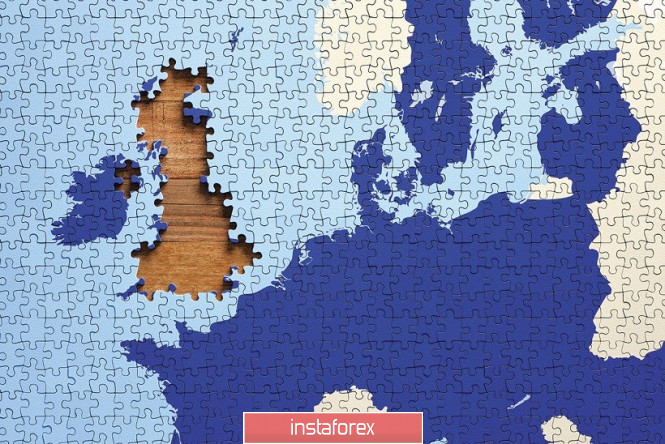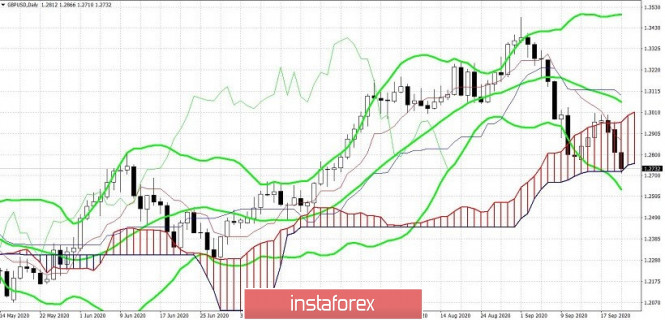The pound continues to plunge down. After a short rise, the GBP/USD pair fell to the bottom of the 27th figure, opening new price horizons for itself. The pair traded in the 1.24-1.27 range throughout July, after which it went up against the background of a weakening dollar and optimism about negotiations on the Brexit trade deal. At the moment, we are observing a mirror situation: the greenback is strengthening throughout the market, and hopes for a deal are dwindling every day, amid consideration by the House of Commons of the resonant draft UK Internal Market Bill. The threat of a second wave of the coronavirus epidemic in Great Britain organically complements the negative fundamental picture for the pound, which is why it is forced to retreat throughout the market.
Let's start with the political battles within the walls of the British Parliament, where a scandalous bill is being considered for the second week, which, in fact, crosses out some of the provisions of the Brexit deal. Prime Minister Boris Johnson continues to insist that this law will ensure the integrity of the UK internal market after the end of the transition. However, according to European and many British politicians, this legislative initiative violates the norms of international law. Just today, the German Minister for European Affairs Michael Roth made a rather harsh statement, saying that the Brits should "stop playing games in negotiations with Brussels."

But despite the powerful political confrontation, the resonant bill passed the first reading - 340 deputies of the Lower House of Parliament voted for it. A second vote is expected this week. During the discussion of the amendments, Johnson agreed to the amendments, according to which the "last word" in the issue of changing the Brexit deal will remain with the House of Commons, and not with the government. On the one hand, this is a compromise, but on the other hand, it does not change anything in the context of relations with Brussels. As the former British Prime Minister Theresa May noted, "a violation of international obligations will still remain a violation of international obligations, regardless of whether it is allowed by the prime minister or Parliament." A similar position is voiced by EU representatives, threatening to withdraw from the negotiation process to conclude a deal if the law is still adopted.
The pound was afloat for some time due to the notorious position of the House of Lords. Most peers do not support Conservative initiatives, especially anti-European ones. But at the end of last week, representatives of the British government recalled the existence of the Salisbury Convention, according to which members of the House of Lords should "without delay pass bills aimed at implementing the election program of the winning party or coalition." According to Johnson, his legislative initiative falls within the scope of this convention. In addition, take note that the Upper House of the British Parliament is not an appellate instance that can overturn or block certain bills. Peers can express their opinions in the form of amendments, which can later be rejected by members of the Lower House.
In other words, GBP/USD buyers have lost an important advantage of a fundamental nature that kept the pair at the borders of the 30th figure. If the second vote is in favor of the controversial bill, the pound will accelerate its decline.
In addition, details of tightening quarantine restrictions in the UK have become known today. Ahead of which, Johnson has ruled out a second nationwide lockdown, but investors were not pleased with the latest measures either. In particular, now all pubs, bars, restaurants and other similar establishments must close no later than 22:00. The list of places where it is necessary to wear masks will also be expanded, and compliance with the rules will be stricter - even the military will be involved in helping the police. It is obvious that the tightening of quarantine will negatively affect the recovery process of the economy. First of all, the labor market will suffer, consumer activity will decrease, and the service sector, which has just begun to show signs of life, will be under attack.

To be fair, the GBP/USD pair is decreasing not only due to the weakening of the pound, but also due to the general strengthening of the dollar. The greenback is in high demand amid a surge in anti-risk sentiment - a loud scandal with FinCEN, as well as coronavirus anti-records make investors nervous. In addition, US Treasury Secretary Stephen Mnuchin just announced that the White House is working with Congress representatives on the next program to help the economy. This rhetoric provided additional support for the greenback.
All this suggests that the downward dynamics will continue for the GBP/USD pair. At the moment, bears are testing the lower border of the Kumo cloud on the daily chart, which corresponds to the 1.2730 level. If sellers overcome this support level (which I personally have no doubt about), then they will open their way to the lower line of the Bollinger Bands indicator - to the 1.2630 level. Short positions are a priority both in the short and (even more so) in the medium term.
The material has been provided by InstaForex Company - www.instaforex.com